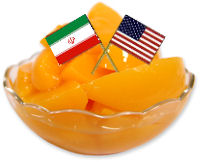![Meroe (49) by joepyrek [CC-BY-SA-2.0 (http://creativecommons.org/licenses/by-sa/2.0)], via Flickr https://flic.kr/p/dD4ue9 [cropped] Meroe (49) by joepyrek [CC-BY-SA-2.0 (http://creativecommons.org/licenses/by-sa/2.0)], via Flickr https://flic.kr/p/dD4ue9 [cropped]](https://www.exportlawblog.com/images/meroe.jpg) In October 2017, OFAC started down the long and winding road of eliminating the sanctions on Sudan. As we noted in a post then, OFAC — rather oddly — did not just get rid of the Sudanese Sanctions Regulations but simply made effective section 538.540(a) which was a general license to do everything prohibited by the SSR. It also made effective section 538.540(b), which was a general license to export agricultural commodities, medicine and medical devices for one-year after signing a contract for the export of such goods.
In October 2017, OFAC started down the long and winding road of eliminating the sanctions on Sudan. As we noted in a post then, OFAC — rather oddly — did not just get rid of the Sudanese Sanctions Regulations but simply made effective section 538.540(a) which was a general license to do everything prohibited by the SSR. It also made effective section 538.540(b), which was a general license to export agricultural commodities, medicine and medical devices for one-year after signing a contract for the export of such goods.
Finally, a few days ago on June 29, OFAC took the momentous step of repealing the Sudan Sanctions Regulations in their entirety. Nothing in the Federal Register notice repealing the SSR indicates what had occurred since October 2017 that meant now — as opposed to last October — was a propitious time to repeal the SSR. But, as they say, better late than never.
In addition, the latest Federal Register notice moved the general license in section 538.540(b) for agricultural commodities, medicine and medical devices from the now defunct SSR to section 596.506 of the Terrorism List Governments Sanctions Regulations. This, of course, results in an odd situation where, due to the repeal of the SSR, you can send any and all EAR99 items to Sudan without needing to comply with a general license but aspirin requires you to comply with the terms of a general license.
This is the result of section 906(a)(1) of the Trade Sanctions Reform and Export Enhancement Act of 2000 (“TSRA”) which says that agricultural commodities, medicine and medical devices could only be exported to state sponsors of terrorism pursuant to a 1-year license. Of course, there is no way that Congress intended to impose more stringent controls on aspirin and tongue depressors than other EAR99 items like shoes (which can be made into bombs) and razor blades. The idea of TSRA was that where the President had comprehensively sanctioned a country, broader humanitarian reason would prohibit him or her from restricting exports of aspirin, tongue depressors and apples to the country. If the country was a state sponsor of terrorism then a license would be required. But there is no indication that Congress meant for section 906 to apply the license requirement to food and medicine when all other sanctions had been lifted. Not even Congress, well, not even most of Congress could imagine that aspirin is more useful to terrorists than shoes and razor blades.

 Posted by
Posted by  Category:
Category: 

![USDA by Dlz28 via https://en.wikipedia.org/wiki/File:United_States_Department_of_Agriculture,_Jamie_L._Whitten_Federal_Building,_Washington_DC_(12_June_2007).JPG [Public Domain] USDA by Dlz28 via https://en.wikipedia.org/wiki/File:United_States_Department_of_Agriculture,_Jamie_L._Whitten_Federal_Building,_Washington_DC_(12_June_2007).JPG [Public Domain]](https://www.exportlawblog.com/images/USDA.jpg)
 Last week, the United States Court of Appeals for the D.C. Circuit issued its
Last week, the United States Court of Appeals for the D.C. Circuit issued its 

